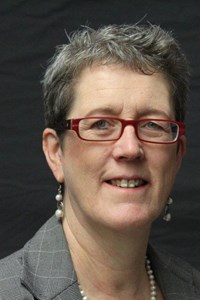Dr Kathy McLean shares her journey from clinician to executive medical director and looks at how NHS leaders can encourage more clinicians to pursue senior roles.
When I started as a junior doctor in the early 1980s, I had no idea that I would end up as the medical director of a national organisation supporting providers. Looking back now, I can see how taking on new roles that enabled me to make a difference to patients beyond directly delivering care, and being supported by inspiring leaders, helped me on my journey.
It hasn't been straightforward - it's taken me down routes I could never have anticipated. However getting involved in clinical pathway redesign work, joining committees and working on change programmes as a consultant, and overseeing the merger of two medical directorates as a clinical director, all built my confidence and gave me new perspectives. And eventually this led to roles in the East Midlands Strategic Health Authority, then the NHS Trust Development Authority, and now NHS Improvement.
These were all great opportunities to learn - about the NHS, about change, and about people - and I recognise many of the things I dealt with along the way in our new framework for action on clinical leadership.
The framework sets out some of the many barriers people with clinical backgrounds, and indeed with other non-traditional backgrounds, may face trying to get into the most senior leadership roles.
Executive Medical Director and Chief Operating Officer
The framework sets out some of the many barriers people with clinical backgrounds, and indeed with other non-traditional backgrounds, may face trying to get into the most senior leadership roles. I think it's fair to say there's a lot of them - which may seem rather daunting - but diversity brings many benefits to teams trying to innovate, and it's no different at senior levels. As the NHS faces an increasingly complex set of challenges, doing things the way we've always done them is unlikely to work.
We need new ways of approaching problems. In my own experience, meeting and working with people who aren't like me has been enriching because our different training routes and experiences gave us different ways of thinking. Helpfully, the framework brings together a range of ideas for how to support these passionate people to realise their potential. Remember that they are already working in our organisations. Done well, I am certain this will make a difference to the care we provide.
In my own experience, meeting and working with people who aren't like me has been enriching because our different training routes and experiences gave us different ways of thinking.
Executive Medical Director and Chief Operating Officer
Two other factors have been especially important for me. I was fortunate to find myself working for exceptional people, whom I saw as role models, and who saw my potential and encouraged me to take each next step. This is something that all we senior leaders can do - 'lift as we climb', helping all those coming up behind us to be the best that they can be. Of course, it takes time, which can seem like a luxury. However spotting and nurturing talent is what great organisations do to make sure they are delivering great care to patients, not just now but in 5, 10, 15 and 20 years in the future.
The second factor is having a coach. Someone outside my organisation who could challenge me and help me develop my skills through talking about what was happening at work, what I was finding difficult, and what I was learning. This was invaluable for my personal development and my resilience - so good in fact, that I've been seeing my coach for 17 years. Lots of areas in the country have registers of coaches that people in the NHS can access for free. Do think about it, especially if you're feeling uncertain about the next step in your career.
Lots of areas in the country have registers of coaches that people in the NHS can access for free. Do think about it, especially if you're feeling uncertain about the next step in your career.
Executive Medical Director and Chief Operating Officer
The fantastic framework case studies show me that others have had similar experiences to mine. These all lead me to think that we aren't so different really, but that sometimes it's hard to see how someone's skills fit with what we think are the requirements of the job. It'll take work on 'both sides', so to speak, to start increasing professional diversity at senior levels. It might feel a bit risky, but as senior leaders working on delivering the long term plan when service pressures are so great, we can't afford not to take this on if we want to secure the future of our NHS.
About the author

